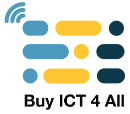Public Policy & Digital Inclusion in Brazil
Posted on September 20, 2017

Vice President for Global Strategy and Development, G3ict
According to Brazil’s 2010 census, there are 45 million persons with disabilities in the country, or 23.9% of population. This week the government of Brazil is taking some unique steps to raise awareness about the accessibility of technology and the digital inclusion of all its citizens, including those with disabilities. I am honored that the government has invited me to participate on behalf of G3ict in an international seminar, Accessibility and Inclusion: Expression of Citizenship, here in Brasilia on September 20-21.
The purpose of this conference is to promote equal opportunities for persons with disabilities in Brazil. The event is being led by the Tribunal de Contas da União (TCU) in cooperation with other agencies of the government, including the National Secretariat for the Rights of Persons with Disabilities (Secretaria Nacional de Promoção dos Direitos da Pessoa com Deficiência - SNPD). G3ict has partnered for some time now with that SNPD to support its efforts to lead the implementation of the United Nations Convention on the Rights of Persons with Disabilities (CRPD) in Brazil. Brazil ratified the CRPD in 2008.
At the international seminar this week, I will be highlighting global trends in digital inclusion laws and policies and discussing how good international practices can be applied in Brazil. I will be pointing to some good examples that Brazil might want to replicate, including the adoption of broad civil rights and non-discrimination legislation like the Americans with Disabilities Act in the US and Disability Discrimination Act in the UK. I will also make the case for using international standards to support strong policies, like adopting ISO/IEC 40500:2012 [Web Content Accessibility Guidelines (WCAG) 2.0] to help the government make progress in making its own websites accessible. I will spend a lot of time talking about the how adopting a public procurement policy to ensure that the government buys only accessible technology can help support digital inclusion. I will point to examples in the US with Section 508 and in Europe with its Procurement Directive and accessibility standard EN 301 549. I will also point to the recent steps in that direction that countries like Australia, Mexico, and Canada are taking.
I am excited to be here in Brasilia again this week and working with different government agencies and departments. The international event they are hosting is quite timely and can have a real impact in Brazil. G3ict is committed to continue to partner with them on their journey to broader and deeper digital inclusion.







